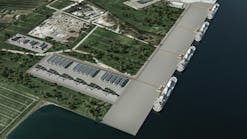Hydrogen Fuel Cell firm AFCP acquires CHP power project pipeline for C&I sector
Canadian hydrogen power developer Alkaline Fuel Cell Power Corp. is acquiring a portfolio of dozens of prospective combined heat and power (CHP) projects to meet the needs of commercial and industrial (C&I) customers with H2-fueled options.
Alkaline Fuel Cell Power (AFCP) has entered into an agreement to buy the CHP generation business of AI Renewable 1028-I Limited Partnership. AI's on-site power solutions can be adapted to utilize hydrogen and AFCP fuel cells, the companies said.
AI’s pipeline totals more than 30 potential CHP projects at various stages of development. One is secured by a power purchase agreement and ready to begin the engineering, procurement and construction phase.
The cost of bringing the CHP project pipeline into commercial operation within the next two to three years could total $50 million, AFCP reported. Securing the CHP projects remains subject to mutual agreement with the potential accounts.
Related stories
CHP could be Peachy, Georgia Tech study says
Capstone Green Energy installation Gas-fired Microturbines at Japanese Chemical plant
Subscribe to EnergyTech's free, tri-weekly Newsletter to keep track of the C&I Energy Transition
CHP power is an option desired by many C&I customers for its energy efficiency in utilizing both electricity and residual heat for operations (see AI Renewables graphic in image gallery). Mission critical customers such as universities also favor it for the on-site power security to protect against major grid outages.
“Alkaline Fuel Cell Power Corp. continues to progress towards commercialization of our micro-combined heat and power system,” Matthew Fisher, interim CEO of AFCP, said. “The integration of AI’s CHP business along with key members of management will help AFCP accelerate our milestone timelines and the transition of existing CHP to a clean zero-emission hydrogen powered energy solution with immediate revenue and a very large project pipeline, setting the stage for growth worldwide.”
If all of the projects are realized, AFCP estimated, the annual revenue could top $16.6 million for the company. The deal with AI Renewable could close within 30 days.
AFCP is working to create CHP systems and gain market share of the nearly 10,000 high rise buildings in Canada and 163,000 high rise buildings globally.






